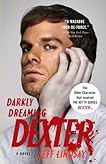
I'm very excited to have author Douglas Carlton Abrams at mis(h)takes. He has kindly agreed to answer some questions about himself and his book Eye of the Whale.
----------
A little background info before we go on:
Douglas Carlton Abrams is a former editor at the University of California Press and HarperSanFrancisco. Abrams writes fact-based fiction that tells an exciting story while at the same time changing the world we live in. His first book, The Lost Diary of Don Juan, has been published in thirty countries around the world and was recently optioned for film.
Doug is also the co-founder of Idea Architects, a book and media development agency that works with visionary scientists, scholars, and spiritual leaders to create a wiser, healthier, and more just world. Abrams has collaborated with a number of the world’s great scholars, scientists, and moral leaders, including Archbishop Desmond Tutu, founder of EarthSave International and best-selling author John Robbins, primatologist Frans De Waal, and astrophysicist Joel Primack.
You can visit his website here.
You can visit his website here.
Check out his personal blog on the site as well!
----------

Me: Tell us a little about Eye of the Whale.
Douglas: This is an eco-thriller about a marine biologist who must risk everything to decode the mysterious song of a trapped humpback whale and its implications for human survival.
Me: What inspired you to write Eye of the Whale?
Douglas: I was sitting by the fire reading my twin daughters a children’s story about a trapped whale, just after another whale had swum up the Thames. A scientist friend was visiting and started telling me some astonishing facts about new environmental dangers to our children’s and other animals’ health. I asked myself: what if these events were connected? What if whales and humans were threatened by the same dangers? I knew that the answer to this question would result in a thrilling and important story. I had no idea when I started quite how thrilling and important the story I discovered would be.
Me: What kind of research did you do for the book?
Douglas: I worked with some of the world’s leading scientists—marine biologists, eco-toxicologists, veterinarians, physicians, and others. I also believe in experiencing what my characters experience, so I went swimming with the whales in Tonga, cage diving with the great white sharks off the Farallon Islands, and even met modern day whalers in the Caribbean.
Douglas: This is an eco-thriller about a marine biologist who must risk everything to decode the mysterious song of a trapped humpback whale and its implications for human survival.
Me: What inspired you to write Eye of the Whale?
Douglas: I was sitting by the fire reading my twin daughters a children’s story about a trapped whale, just after another whale had swum up the Thames. A scientist friend was visiting and started telling me some astonishing facts about new environmental dangers to our children’s and other animals’ health. I asked myself: what if these events were connected? What if whales and humans were threatened by the same dangers? I knew that the answer to this question would result in a thrilling and important story. I had no idea when I started quite how thrilling and important the story I discovered would be.
Me: What kind of research did you do for the book?
Douglas: I worked with some of the world’s leading scientists—marine biologists, eco-toxicologists, veterinarians, physicians, and others. I also believe in experiencing what my characters experience, so I went swimming with the whales in Tonga, cage diving with the great white sharks off the Farallon Islands, and even met modern day whalers in the Caribbean.
Me: Which of your characters would you say is most like you? Why that character?
Douglas: I really love the main character, Elizabeth McKay. Actually, I’m quite attached to all of my characters. I especially like some of the whale characters. It was an extraordinary challenge to write from their point of view without anthropomorphizing. I had to work with marine biologists to determine what whale intelligence, thought, and communication might actually be like.
Me: If you could write a book about absolutely anything with any other author, who would you choose and what would the book be about?
Douglas: Perhaps an eco-thriller with Al Gore about global warming or something with Gabriel Garcia Marquez, whose work I love.
Me: Are you planning on any sequels to this book?
Douglas: Not currently.
Me: What are you currently working on?
Douglas: Right now I’m waiting for the next question to come to me. Meanwhile, I’m so consumed with the exciting interest with Eye of the Whale and the promotion of the novel that I don’t have a ton of time to be asking that question.
Me: Do you have any advice for upcoming writers?
Douglas: Start with a question that you deeply want to know that answer to. Focus on plot, on getting the plot, the story breathless, and read Robert McKee’s Story.
Me: If you weren’t a writer, what other career would you pursue?
Douglas: Well, I have a multiple career disorder already, since I’m a book editor and agent, but I think I’d love to be a helicopter pilot. Have to write a character who is, so I can try it out!
----------
Thank you so much Douglas! Be sure to check back tomorrow for my review and watch out for a guest post on Thursday!




























1 comments:
Great Q&A. The research part sounds very interesting and fun.
Post a Comment
Questions, comments, and discussions are more than welcome! Thanks so much for visiting. 8)